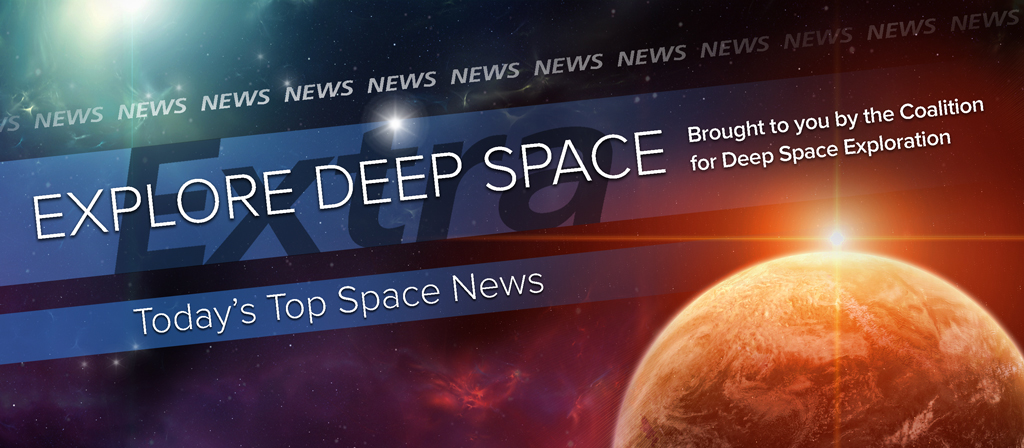In Today’s Deep Space Extra… Now, is no time to reset a visionary U.S. civil space policy with its focus on the human exploration of Mars.
Human Deep Space Exploration
NASA’s Human Spaceflight Program can’t afford another reset from the next President
Wired.com (3/21): At six years old, the reigning U.S. civil space policy has come too far with its plans to reach Mars with astronauts in the mid-2030s with NASA’s Space Launch System exploration rocket and Orion crew capsule to re-set, writes Peter Juul, a policy analyst at American Progress. In an op-ed, Juul cautions that an imminent change in White House administrations could prompt as much. It’s unnecessary, he contends. “Those guidelines leave plenty of room for the next administration to put its mark on America’s human space exploration program without ripping it up at the roots,” he writes of the 2010 policy objectives.
Permanent Mars colony is ‘long way down the road,’ NASA says
Space.com (3/23): NASA intends to establish a human research base on Mars during the 2030s, not a permanent colony, according to Ben Bussey, the chief exploration scientist in NASA’s Human Exploration and Operations Mission Directorate. Agency planners are currently evaluating where the initial long term Exploration Zone should be established. The base at the zone’s center would anchor a circular region 200 kilometers across filled with both interesting science pursuits and resources — like water — that astronauts could extract from the air and soil to help support their presence.
Space Science
Alan Stern outlines New Horizons’ extended mission at Planetary Science Conference
Spaceflight Insider (3/24): New Horizons, the NASA spacecraft that carried out the first flyby of Pluto last July 14, will continue its mission into the Kuiper Belt, studying as many as 20 additional objects, Alan Stern, the spacecraft principal investigator, told the Lunar and Planetary Science Conference this week. Next on the list for a visit is 2014 MU69, a small KBO discovered with the Hubble Space Telescope in 2014. A close pass is planned for Jan. 1, 2019. Launched Jan. 19, 2006, New Horizons mission has been extended until 2021.
Scientist to head NASA’s Astrobiology Institute
Mountain View Voice, of California (3/23): Penelope Boston, a biologist with expertise in extremophiles, will lead NASA’s Astrobiology Institute. Boston replaces Carl Pilcher.
Is Ceres’ mysterious bright dome an ice volcano?
Discovery.com (3/23): The highest resolution images yet of the large asteroid Ceres suggest a bright region in the large crater Occator is a dome feature that may be attributed to active internal geologic process that resemble volcanism, according to members of NASA’s Dawn mission science team. Dawn has been orbiting Ceres since March 2015.
Update: Lopsided ice on the moon points to past shift in poles
Science (3/23): New observations of subsurface ice deposits on the moon suggest the moon’s north and south poles shifted 5.5 degrees over billions of years, scientists reported this week at the Lunar and Planetary Science Conference near Houston. A hot spot within the moon may be responsible.
Europe’s ExoMars orbiter smoothly cruising toward red planet
Spaceflightnow.com (3/23): The joint European/Russian ExoMars mission is functioning as intended following initial check outs a week after liftoff, according to Michel Denis, ExoMars flight director at the European Space Operations Center in Darmstadt, Germany. “We have done a test maneuver, which was very accurate. It looks good for the commissioning, so far, from the small fraction of it,” he said. Lift off was Mar. 14. The Mars Trace Gas Orbiter and the Schiaparelli lander are due at their red planet destination on Oct. 19.
Mitsubishi to launch UAE’s Mars probe
Khaleej Times (3/22): The United Arab Emirates plans to launch a Mars probe in 2020 to mark the country’s 50th anniversary. Japan’s Mitsubishi Heavy Industries will launch the Hope Probe.
Low Earth Orbit
After year in space, astronaut Scott Kelly revisits Russia’s star city
Sputnik International (3/24): NASA astronaut Scott Kelly is in Star City, Russia this week to reunite with cosmonaut Mikhail Kornienko. Kelly and Kornienko ended a 340 day flight to the International Space Station on Mar. 1.
DoD will spend $2 billion on space control this year
Space News (3/23): The control measures are intended to protect U.S. satellites from attack by adversaries. The $2 billion is part of $5 billion the Pentagon plans to invest in new space capabilities in 2017, U.S. Defense Secretary Ash Carter informed the U.S. House Armed Services Committee.
Commercial to Low Earth Orbit
Why the most maligned rocket in the world is also one of the most reliable
Washington Post (3/23): One of the world’s most successful rockets, the United Launch Alliance Atlas V, is also one of this nation’s most maligned among policy makers. It’s all about an imported rocket engine, the RD-180, and its place of manufacture, Russia. Late Tuesday night, it continued to bolster its impressive box score, launching for the 62nd straight time without a failure, the Post reports.

